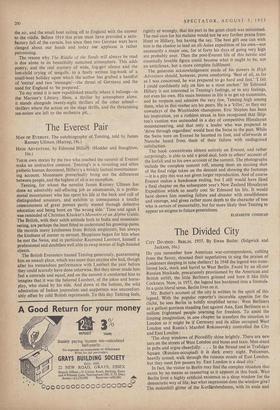The Everest Pair
MAN OF EVEREST. The autobiography of Tenzing, told by James Ramsey Ullman. (Harrap, 18s.) THEIR own stories by the two who reached the summit of Everest make an instructive contrast. Tenzing's is a revealing and often pathetic human document, Hillary's a briskly factual mountaineer- ing account. Mountains proverbially bring out the differences between people, and the highest of all is no exception.
Tenzing, for whom the novelist James Ramsey Ullman has done an admirably self-effacing job as amanuensis, is a profes- sional mountaineer who has spent his life at the beck and call of distinguished amateurs, and exhibits in consequence a touchy consciousness of great powers partly wasted through defective education and being born on 'the wrong side.' Time and again I was reminded of Christian Klucker's Memoirs of an Alpine Guide. The British, with their sahib attitude both to India and mountain- eering, are perhaps the least fitted to understand his growing-pains. He records many kindnesses from British employers, but always the kindness of master to servant. Happiness began for him when he met the Swiss, and in particular Raymond Lambert, himself a professional and doubtless well able to swap stories of high-handed clients.
The British Everesters treated Tenzing generously, guaranteeing him an assault place, which was more than anyone else had, though after his tremendous performance with Lambert the year before they could scarcely have done otherwise. But they never made him feel a comrade and equal, and on the summit it comforted him to imagine that it was the beloved Lambert, of the jokes and horse- play, who stood by his side. And down at the bottom, the wild admiration of Indian journalists and supporters was uncomfort- ably offset by cold British reprimands. To this day Tenzing feels, rightly or wrongly, that his part in the great climb was minimised. The real cure for his malaise would not be any further praise from Hunt or Hillary, but having the say. The best gift one can wish him is the chance to lead an all-Asian expedition of his own—not necessarily a major one, for at forty his days of going very high are probably over. Then the post-Everest life of this heroic and essentially lovable figure could become what it ought to be, not an anticlimax, but a more complete fulfilment.
The generous acknowledgement made of his powers in High Adventure should, however, prove comforting. 'Best of all, as far as I was concerned, he was prepared to go hard and fast.' I felt 1 could confidently rely on him as a stout anchor.' Sir Edmund Hillary is not interested in Tenzing's feelings, or in any feelings, not even his own. His main business in life is to get up mountains, and he respects and admires the very few, Tenzing high among them, who in this matter are his peers. He is a 'killer,' as they say nowadays of the Wimbledon champions. Eric Shipton has been his inspiration, yet a ruthless streak in him recognised that Ship- ton's caution was outmoded in a day of competitive Himalayan mountaineering, and that only a leader who was prepared to `drive through regardless' would beat the Swiss to the post. While the Swiss were on Everest he haunted its foot, and aftefwards at Namche heard from them of their failure with undisguised satisfaction.
The book concentrates almost entirely on Everest, and rather surprisingly, is able to add a good deal, both to others' account of the Icefall and to his own account of the summit. The photographs include the complete summit roll, among them an exciting shot of the final ridge taken on the descent and showing the footsteps —it is a pity this was not given larger reproduction. And of course Everest makes a handsome ending, but I still would have liked a final chapter on the subsequent year's New Zealand Himalayan Expedition which so nearly cost Sir Edmund his life. It would have shown him meeting failure and disaster with unselfishness and courage, and given rather more depth to the character of bne who is certain of immortality, but far more likely than Tenzing to appear an enigma to future generations.
ELIZABETH COXHEAD


































 Previous page
Previous page